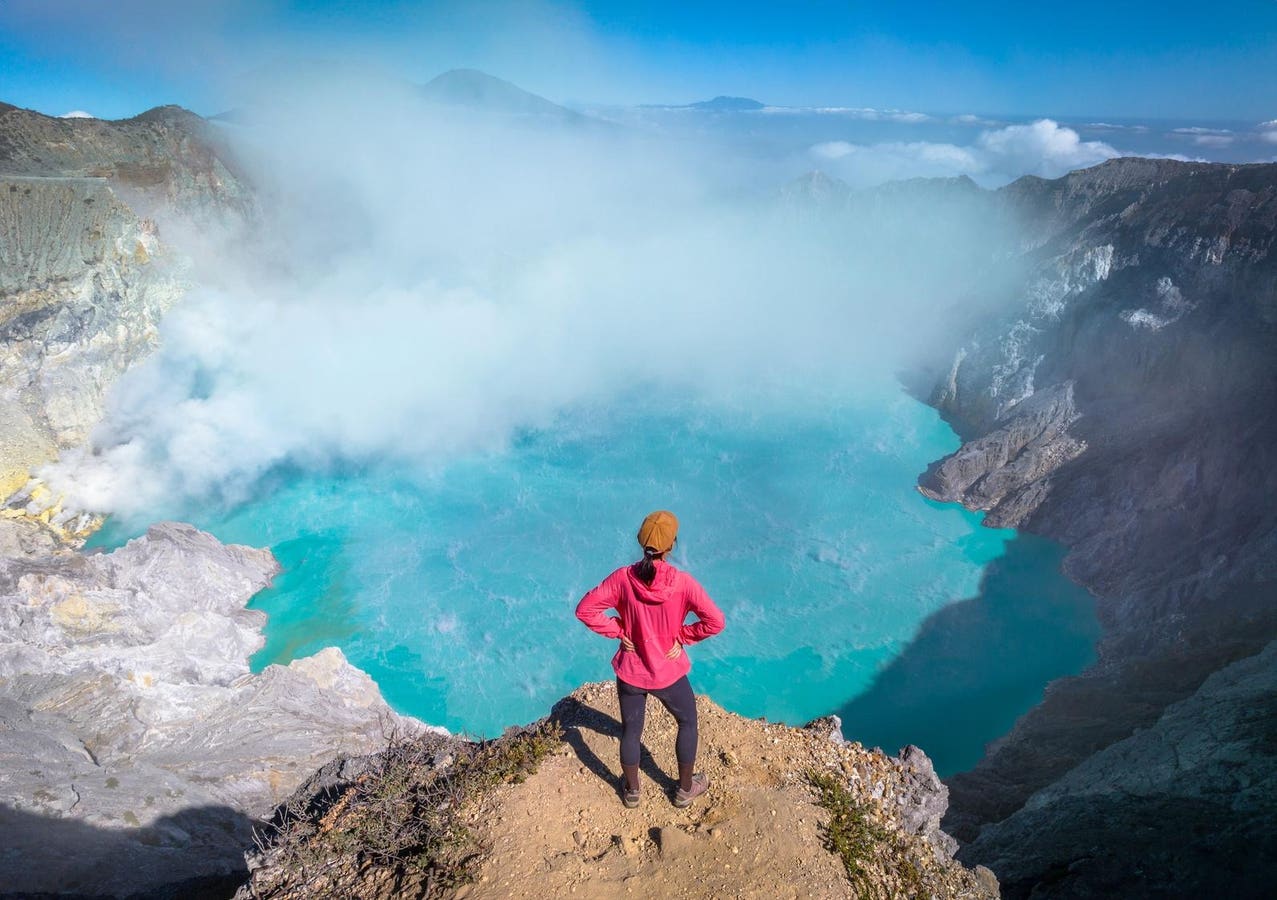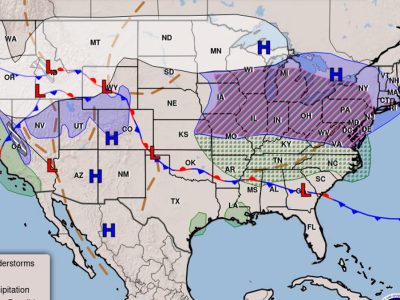Female tourist standing at the rim of Kawah Ijen volcano, enjoying the view of turquoise colored … [+]
Adventure travel has transformed from a niche pursuit into a booming global industry, driven in part by digital nomads and entrepreneurs who are redefining the way we work and explore. These modern adventurers aren’t just seeking scenic getaways—they’re blending professional ambitions with immersive, experience-driven travel. For them, the road isn’t a detour from work; it’s a path to personal growth and rejuvenation.
“You don’t have to be Bear Grylls to enjoy an adventure travel experience,” says Ryan Smith of Bellevue, Ohio, who has completed multiple adrenaline-fueled trips. “We’re not meant to spend our lives in front of a screen—we’re meant to get out there, with nothing between us and the world.”
Beyond the thrill, adventure travel offers a powerful educational component. These trips provide hands-on learning in areas such as wildlife conservation, history, survival skills, and cultural traditions. Travelers can track endangered species with ecologists on an African safari, explore ancient Incan history alongside local guides in Peru, or assist marine biologists in coral reef restoration. Charles Bushkill, who sought an immersive experience in Glacier National Park, found exactly that through an adventure travel company that paired him with expert guides. “I didn’t just visit—I learned about the park’s geology, forests, and delicate ecosystems,” he says. These deep-dive experiences foster meaningful connections with both the destination and fellow travelers.
The numbers reflect the shift toward experiential travel. The global adventure tourism market was valued at $406 billion in 2024, according to Grand View Research, and is projected to grow at an annual rate of nearly 17% from 2025 to 2030. The Adventure Travel Trade Association (ATTA) reports that 70% of travelers now prioritize experiences that emphasize cultural exchange and physical activity. Additionally, a study by PassportCard Nomads found that 82% of digital nomads seek destinations that offer adventure and cultural immersion—underscoring a rising demand for travel that goes beyond sightseeing.
Several factors make adventure travel particularly appealing to this demographic:
Creative Recharge: Entrepreneurs and remote professionals often use travel to disconnect from their demanding routines. Immersing themselves in nature or new cultures helps them recharge creatively and cultivate resilience. Ryan Smith takes an adventure travel trip three to four times a year, “It’s my go-to when I can get time off work, and I always have something to look forward to and daydream about when there’s an OBP trip on my calendar.” He has visited around 25 national parks, a dozen national monuments, and a couple of national forests and state parks.
Flexibility of Remote Work: The rise of remote work has enabled professionals to integrate travel into their lifestyles, often opting for extended stays or work-and-travel arrangements. A recent MBO Partners report found that 17.3 million Americans identify as digital nomads, more than doubling since 2019.
Focus on Wellness: Active vacations, such as hiking or kayaking, provide both physical and mental-health benefits. A survey by the Global Wellness Institute found that 52% of travelers now incorporate wellness activities into their trips.
The adventure travel industry saw a major shift in early 2025 with the closure of REI Adventures. Citing evolving consumer preferences, post-pandemic challenges, and a strategic focus on retail and sustainability, REI Co-op stepped away from the travel sector.
Leading Adventure Travel Companies
Several travel companies have stepped in to meet this demand, offering authentic, hands-on adventures that go far beyond guidebooks and tour buses. Their trips are designed to foster genuine connections—not just with the destination, but also among travelers who share a common passion, whether it’s cycling, wildlife conservation, or remote exploration.
These four standout companies offer adventure-rich, community-driven travel experiences. Each has created genuine connections to the destination, offering unique, immersive journeys that go far beyond typical tourist activities. Each trip is designed with an adventure or activity component designed to cater to travelers with a shared passion or interest. These experiences not only facilitate meaningful connections with local communities but also encourage camaraderie among like-minded travelers. Smith shared that OBP got him hooked on the small group travel experience, “I love going as a solo traveler, entering that new little community. The camaraderie with strangers who share the same passion for exploration is half the fun.”
Off The Beaten Path (OBP): Based in Bozeman, Montana, OBP specializes in immersive, small-group adventures. With trips spanning locations like Alaska, Costa Rica, and the American West, OBP emphasizes personalized itineraries, cultural connections, and a high guide-to-client ratio. Susan Melvin recalled, “I have never been on a trip where I felt so much a part of the local people and scene. Part of that is because of the remoteness of Ofu and part due to the character of our guide, Peter.”
Lindblad Expeditions: Catering to luxury travelers, Lindblad Expeditions offers cruises and land-based adventures to destinations such as Antarctica, the Arctic, and the Mediterranean. Their trips blend exploration with education, featuring onboard experts and local guides.
Natural Habitat Adventures: Known for wildlife tourism and conservation, this company offers journeys to destinations like the Galápagos Islands and Canada’s polar bear country. Their sustainability-focused approach ensures a positive impact on the environment.
DuVine Cycling + Adventure Co.: Combining adventure with culinary and cultural experiences, DuVine offers cycling tours in scenic regions like Italy, France, and Portugal. Their small-group trips feature local guides, gourmet food, and fine wine.
Off the Beaten Path (OBP) has carved out a distinctive space in the travel industry. OBP offers highly personalized journeys tailored for a new generation of explorers—travelers who see adventure as more than just a vacation, but as a catalyst for personal growth and connection.
What sets OBP apart is its commitment to intimate, small-group travel, with each trip designed for just 8 to 10 participants. The small group setup is one of Smith’s favorite parts, “It’s one of the best ways to travel. If you’re nervous about traveling solo, this is the perfect solution.” This exclusive approach not only ensures a high guide-to-client ratio but also allows for greater flexibility and customization. Whether it’s selecting between breathtaking hiking routes in Yellowstone National Park or opting for activities like kayaking and snorkeling in Costa Rica, travelers enjoy an adaptable, immersive experience.
OBP also offers private custom journeys—an ideal solution for entrepreneurs, remote workers, and small groups. For instance, when longtime travelers Phil and Marilyn set out to visit all U.S. national parks, they turned to OBP to help navigate Alaska’s five remote, roadless parks—an ambitious feat requiring expert logistical planning. The result? A customized expedition that met their goals while immersing them in the vast, untamed landscapes of America’s last frontier.
In response to the closure of REI Adventures, OBP is stepping in to support affected travelers, offering limited-time discounts of 10% to 20% on scheduled group trips and custom journeys for 2025 and 2026. CEO Cory Lawrence emphasizes OBP’s mission to provide transformative travel, stating: “Our mission is to offer adventures that are as unique as our guests. This is an opportunity for anyone whose trip was canceled to experience the world in a way they’ll never forget.”
Educational Benefits of Adventure Travel
Adventure travel offers more than physical and emotional rewards; it provides profound educational benefits. Companies recognize the growing desire among travelers to understand the culture and community of their destinations. During the American Samoan trip with OBP, for example, guests visit Aunu`u Island, where they enjoy a locally hosted lunch and experience traditional Samoan cultural, ceremonial, and dance performances. By fostering a deeper understanding of the places they visit, adventure travel companies empower travelers to return home with enriched perspectives and lasting memories.
Guides also take a very personal approach to experiences. Kurt Westenbarger, guide at Off the Beaten Path, describes himself as a guide-voyeur. “I bring people to these places I’ve loved since I was a kid, places I know inside out. And I watch them fall in love, too. The best trips are the ones where my clients take a piece of the park back home in their hearts,” he explained. “I get emotional, seeing my clients fall in love with these places.”










